Windows SQL Server Containers
SQL Server instances delivered on demand, identical to conventionally installed instances and compatible with AD and other infrastructure.
Windocks is known for unique Windows SQL Server containers.
SQL Server containers are created and delivered in seconds and identical to a conventionally installed instance, ensuring compatibility with Active Directory and other software and infrastructure. Over the past 10 years enterprises including Novartis, American Family Insurance, and many more have come to prefer containers for dev/test and lower level environments. Up to 50 or more containers run on a single VM, allowing for simplified infrastructure, and reduced support and maintenance.
SQL Server containers combined with database cloning delivers complete dev/test environments on demand, and are ideal for database DevOps and Continuous Integration.
- All releases of SQL Server 2008 onward
- Database engine, Integration, Analysis, Agent, and Reporting
- Compatible with Active Directory and all other infrastructure
- Scales to 50 or more containers on a VM
Gartner Research
Reference Architecture Brief: Continuous Integration
Published:14 May 2025
Continuous integration, essential to DevOps and continuous delivery, is a way of integrating, building and testing that is crucial for frequent product delivery. Software engineers should review this reference architecture for Cl to support the secure and frequent delivery of valuable business solutions.
Gartner recognizes Windocks as a leader in database DevOps and CI
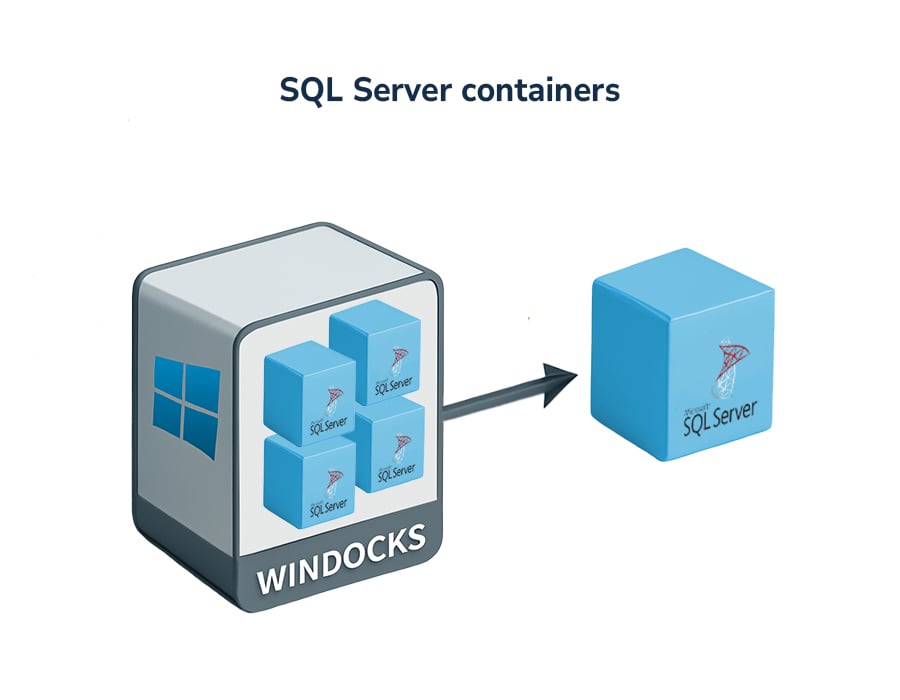
Geographically distributed teams
The pandemic surfaced the need for support for remote workers and teams. Containers have proven themselves with Active Directory or cloud based authentication, for remote access to isolated containers.
Writable snapshots and point-in-time environments
Windocks SQL Server containers are also unique in supporting writable snapshots. A developer, for example, completed work on a production bug and needs to share the environment for further testing. The environment is simply saved or snapshotted, creating a new image that is cloned and shared with the team.
Windocks SQL Server cloning also supports delivery of near real-time production environments, or point in time environments, using transaction log backups. Improve your customer experience with improved production debug and support, with production environments available on demand.
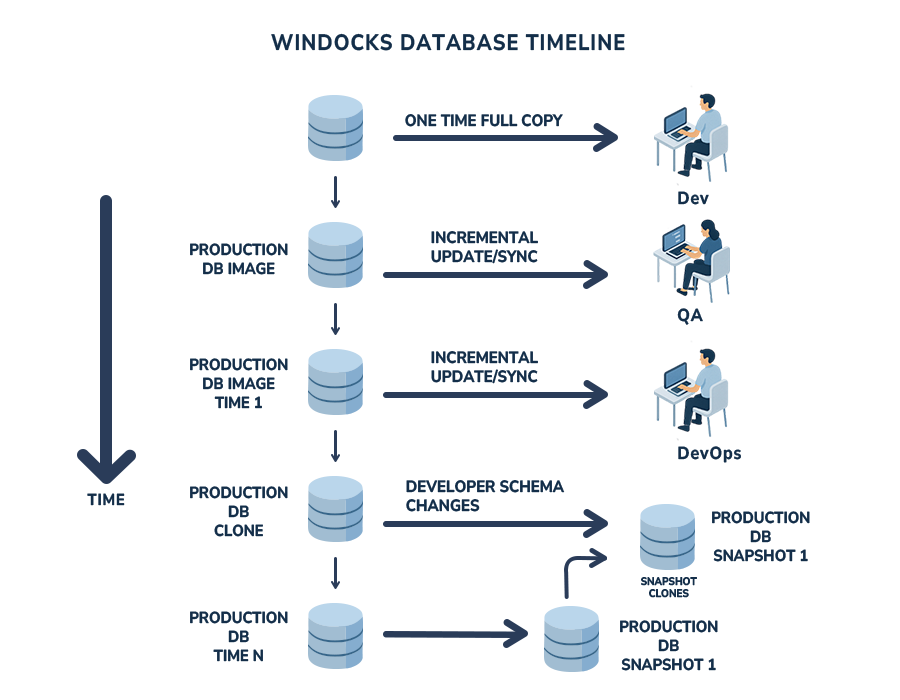
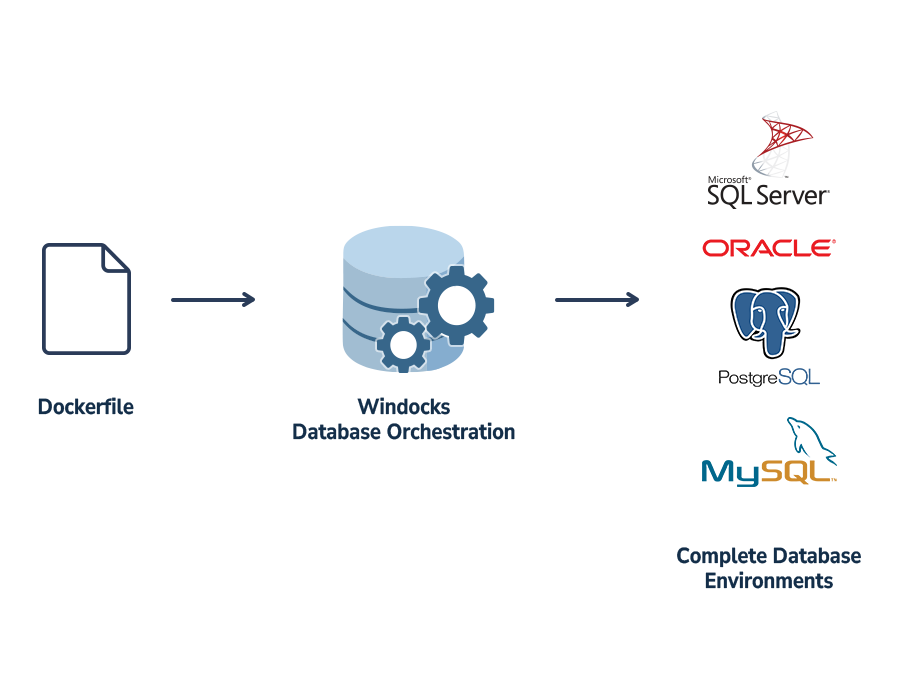
Linux Database Containers
Windocks supports Oracle, Postgre, MySQL, and other Linux environments. Oracle support scales to databases of 50 TB or more with production stand by instances, with near real-time and timeline based environments.
Safe, compliant, business-ready data
Windocks containers are always paired with database cloning, and synthetic data based data masking. The result are images and delivered environments with built-in data compliance and privacy.
Windocks also provides comprehensive audit logs, simplifying annual audit support.
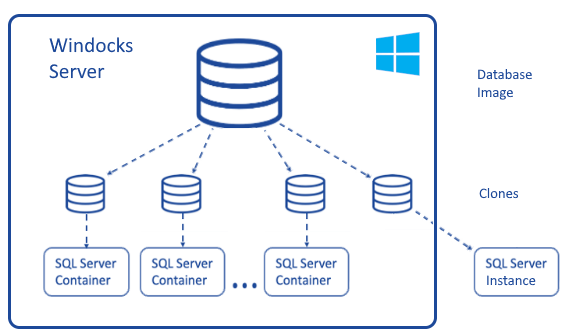
Concepts in stateless applications and microservices
Containers - are isolated lightweight processes running applications or microservices on different ports on a single machine. Containers are delivered from images which are built with all the software and information needed to deliver the containers.
Kubernetes - Kubernetes is a container orchestration system that runs multiple containers from multiple images in a cluster of machines.
Containers are used in dev, test, staging, production environments to run applications or services. An image is built, containers from that image are delivered into dev, test environments and as the containers pass tests in these environments, the build is promoted to staging and then production.
There is widespread use of containers for running stateless applications and microservices. Technologies such as docker enable delivery of containers with the application or microservice from images. For example, you can build an image of a .Net application using a dockerfile by specifying the version of .Net you use, the files that are needed to build the application/service, and the dotnet command to run. Once the image is built with docker, you can create containers, each running that service. Docker takes care of instrumenting all the dependencies, the files and starting the service in each container.
Relevant technologies in database applications
Database containers - a container technology (Docker) is needed for the database and version. Docker provides the container technology for Oracle. Windocks provides the container technology for SQL Server Windows.
Database cloning - It is a best practice to test and stage with safe production data. Database cloning provides writable databases in seconds (no matter how big the database). Windocks provides database cloning technology for Oracle, SQL Server, PostGre, MySQL and others.
Database masking - Compliant test data must not expose PII or sensitive data. Data masking provides a process to identify sensitive data and replace it with data that protects personal information. Windocks includes synthetic data based data privacy, but also supports in-house and third party data masking as well.
Database orchestration - An orchestration technology manages and orders the application of services to the database environment, including containerization, cloning, masking, script repositories, authentication, authorization - to deliver databases ready for the business use. The alternative to orchestration is to develop and run bespoke scripts to accomplish these steps. Windocks orchestration is based on the Docker API and dockerfiles, and supports the use of local executables and scripts to meet these needs.
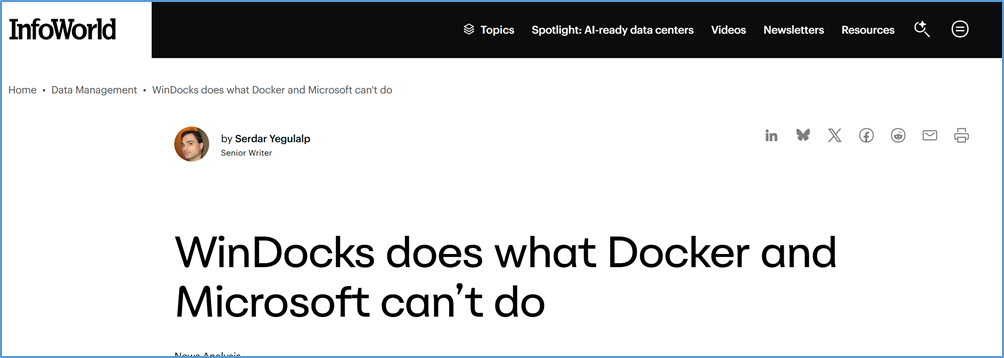
Windocks delivers 6 powerful capabilities

Database Cloning
Create writable copies of databases in seconds instead of hours. This enables fast development, testing, and analytics, helping teams work efficiently with full, realistic environments without impacting production systems.

SQL Server containers
Run multiple isolated SQL Server instances on a single machine using Docker Windows containers. This maximizes hardware utilization, simplifies testing and deployment, and provides great support for remote teams.
.png?width=60&height=60&name=database%20(2).png)
Data masking
Protect sensitive data by replacing Personally Identifiable Information (PII) like names, phone numbers, and addresses with synthetic data that is modeled to reflect source distribution. This ensures compliance with regulatory and enterprise policies, and exposure of real customer data.

Feature Data
Code free data aggregation, cleansing, and enriching from multiple sources to create “features” for Machine Learning and AI. Feature data enables advanced analytics and ML modeling, such as predicting fraudulent transactions, improving decision-making, and driving business outcomes.

Single source of truth
Combine data from multiple databases into a unified “feature data table.” This provides accurate, consolidated information across systems, eliminates duplication, and ensures consistent reporting for analytics, compliance, and business intelligence needs.
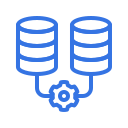
Database subsetting
Reduce large databases to smaller, targeted datasets while maintaining all key relationships and integrity between tables. Subsetting helps accelerate testing, minimizes storage requirements, and protects sensitive information during development activities.
